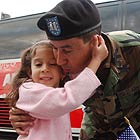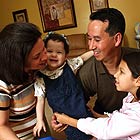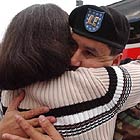|
 |
|
Esta página no está disponible en español. Orlando Sentinel The Long Goodbye By Kate Santich | Sentinel Staff Writer December 16, 2003
PHOTO: JULIE FLETCHER/ORLANDO SENTINEL Dec 16, 2003 Holiday memories. (JOHN RAOUX/ORLANDO SENTINEL) Dec 16, 2003 Dec. 13 dawned gray and gloomy, the sky looking like it might rain. The baby had been sick all night. Alan Echevarria, a captain in the U.S. Army Reserves, hadn't slept a wink. He had skipped dinner and now couldn't stomach breakfast. During the past two years, he had pictured this day in his head a hundred times -- he would be standing in uniform, a bus idling behind him, his wife and children giving him one final, tearful embrace. And then he and his soldiers would head off to war. But in his vision, it was never quite like this. It had been a wild ride. Twice he had been placed on alert; twice he had been taken off. The focus of the war had shifted from Afghanistan to Iraq, from Osama bin Laden to Saddam Hussein. President Bush had declared an end to major combat -- yet attacks on U.S. soldiers in Iraq would soon begin to escalate. And then, on the day Echevarria had expected for so long, as he rode a charter bus bound for Fort Stewart, Ga., U.S. forces about 7,000 miles away would at long last capture Hussein, found hiding in a hole in the ground. Iraqis would dance in the street.
PHOTO: JOHN RAOUX/ORLANDO SENTINEL Tereza Echevarria would be ecstatic, the fears for her husband eased by the news. But Alan Echevarria, a 37-year-old father of two, a guy with a good day job and a nice house in the suburbs of east Orlando, was unswayed. "This changes nothing," he said Sunday night from Fort Stewart. "We still have to go." Saturday calm broken He had first imagined going off to war in the tumultuous days after Sept. 11, 2001, when it seemed certain the United States would retaliate for the terrorist atrocities on its own soil. Sure enough, within weeks, his unit had received the order to be ready to ship out. For the next nine months, he made the daily commute to his job at Florida Hospital Altamonte with a duffel bag packed in his truck. Hecarried his uniform, his steel-toed boots, his laptop computer. If he ventured more than 50 miles from Orlando, he checked in with his command, and each time his phone rang, he braced himself. He updated his will, had long talks with Tereza and followed keenly the news of each twist in global relations.
PHOTO: JULIE FLETCHER/ORLANDO SENTINEL But Christmas came, then New Year's and Easter and Memorial Day, and the alert was lifted. In the fall of 2002, Echevarria was transferred to take command of another unit, just as his old unit was again placed on alert. A month later, they were gone, deployed to Afghanistan. Echevarria wistfully bid them farewell. Part of him wanted to go too. In January of this year, the invasion of Iraq imminent, his new unit was placed on alert and kept there for six months, only to have the order rescinded. Then, on Nov. 6, it was reinstated. "Here we go again," he told his wife. This time, he left his uniform and boots at home. The laptop was broken. "Nothing is going to happen," Echevarria assured his family. Two days later, on a Saturday morning, as he was painting his family room, the stereo blaring, the phone rang. "Stand by, Capt. E," an officer said. "We just received orders for your unit." Echevarria froze, the paint roller still in hand. "OK," he managed to say, "call me back in 10 minutes so I can snap out of it." "Life," Tereza Echevarria would say later, "is so weird." Taking charge It is two weeks before Echevarria ships out, and already his eyes are bloodshot from lack of sleep. But his shoulders are squared and his spirits high. There's authority in his voice. At long last, he will have the chance to do what he has spent nearly two decades training to do. He will have a chance to prove himself not only as a soldier, but now as a commander. A few days after the call came, he had taken leave from his job as a financial counselor and reported to a reservist training center near Orlando International Airport. Here, in a huge brick building, on a floor decorated in khaki and Army green, he began his marathon days, often working from 6 in the morning until 6 at night. He'd better get used to it, he tells himself. In a gray, spartan office lined with unpacked boxes, his phone rings every few minutes. A parade of soldiers stops by with questions.
PHOTO: JOHN RAOUX/ORLANDO SENTINEL In between, Echevarria summons reservists around the state needed to fill in for soldiers who cannot go. Two members of his unit have failed their medical screenings -- one with emphysema, another with high blood pressure. Someone has to take their places. "So now I have to call up someone else and say, 'Hey, you just got assigned to this unit, and we're leaving on the 13th,' " Echevarria says. " 'You need to be here in three days or I'll send the sheriff's department to your house to pick you up.' " But one of the reservists he calls says she is pregnant. She will have to report to an Army doctor for verification. Some part-time soldiers, lured by a sweet package of military benefits -- including college tuition and extra pay -- never really expected to find themselves in harm's way. Some of them will lie to get out of going, especially with mounting casualties. Echevarria checks supplies and weaponry his soldiers will need. He faces piles of paperwork. He organizes a mandatory farewell ceremony and learns -- with his troops -- how to put on a gas mask in darkness and chaos. In case of chemical attack, they will have eight seconds to secure the mask and seal it tight. In some ways, though, he has prepared for war most of his life. Growing up in Puerto Rico, Echevarria dreamed of following in the footsteps of his father, a man who spent more than 30 years in the military, retiring as a master sergeant. When his dad returned from duty, young Alan would try on his fatigues -- still smelling of sweat -- and march around the house. In school, he joined the ROTC, and soon after meeting Tereza at the University of Puerto Rico, he shipped out for two years of active duty in the states. "When I married him, I bought the package," Tereza says. "Some of the wives are not too happy that their husbands are leaving," says Alan Echevarria, having gotten an earful during a few of the phone calls. "I tell them, 'Sorry -- but your husband knew this was part of the deal. I will do my best to bring them back in one piece.' " His unit, the 520th Transportation Detachment, is charged with monitoring supply highways and checking cargo and its documentation. If there is a spill of hazardous chemicals or a mechanical breakdown, his troops would be the ones to deal with it. And because supply lines are sometimes the target of sabotage, the soldiers may find themselves in combat, depending on where they end up -- information they will not be given until the last minute. "It will be somewhere in the Middle East," he says. "That's all I know." His mission is scheduled to last at least a year, at most 545 days or roughly 18 months. That would put him back home in June 2005. Who knows what will happen by then, he says. A daughter's tears For so long Tereza Echevarria had lived in fear of her husband's deployment that when the news finally came she was numb. He called to tell her as she was dropping off their eldest daughter, 8-year-old Sira, at ballet practice. "What do you mean you have to go?" she said, genuinely puzzled. "You have to go where?" When finally she understood, she just sighed. "Well," she told him, "what can you do?" She did worry, though, for Sira. Gabriela, the 2-year-old, is too young to comprehend. But Sira is a daddy's girl, following her father like a puppy, trying on his Army hat and marching around the house, saluting. He drives her to school each morning, the two of them chatting away in the car like fast friends. "You know what?" Tereza told the girl a few days later. "Daddy's getting ready to go for a trip. He has to go to work for the Army." Of course the third-grader had already overheard the phone calls that came at all hours of the day and night. She already grasped some of what was going on. And now she started to cry. "Mommy, I feel so sad," she said. "I know," her mother said, hugging her. "And it's OK to feel sad. But we have to accept it because that's his job. And he's going to be calling, we're going to get e-mails from him, and we're even going to make packages for him." But Tereza avoided the particulars of where her husband will go and how long he would be there. She stopped watching the news until after the girls went to bed. And she spoke to Sira's teacher, asking her to watch for signs of depression. "You don't know what things are happening in that little head," Tereza says. "It is hard enough for adults." She decided to quit her accounting job. As a commander's wife, she would be expected to lead the family support unit. She would need to reassure worried spouses and help answer their questions. More important, she wanted to be home for her children. She will put Sira in charge of keeping a journal for her father. They will also make videos to send and have bought two new cell phones with international calling capability. In January, Tereza's mother will come from Puerto Rico and stay with her. Her in-laws, too, will be in town. Already, so are her sister and Alan's brother. "I am not afraid for my husband," Tereza insists, her toddler busily pulling all the tissues from a box of Kleenex. "You close your book on the day that destiny has for you. My dad went to World War II and Korea -- and he just died three years ago from cancer." She fetches the tissues from Gabriela and gives her a cup of milk. Then Tereza sits on the couch and looks away. "Probably he will be fine," she says. "And if he's not, if it is his time to close his book, I pray that God will give me comfort." Hugs and promises Alan Echevarria will miss -- by four days -- his eldest daughter dancing as an angel in the Orlando Ballet's performance of The Nutcracker. He will miss her First Communion in April. He'll miss both his children's birthdays, of course, his 11th anniversary in August, another Christmas and another New Year's. And once he gets home, he is due for promotion, which means he will be assigned to yet another unit and be vulnerable to yet another deployment. "It's possible," he says with a shrug. He has no plans to leave the Army -- and, under current rules, could not quit now even if he wanted to. But he does not. On the night before he leaves, he packs his footlocker slowly. He doesn't know when or if he will get a break in the next 18 months. Quite possibly he will not see the inside of his house again for a very long time. He wants to soak up the surroundings. But soon Gabriela is sick, and there is no point in trying to sleep. She is up, vomiting, every hour or two. Gradually the sky turns from black to slate, and he heads to the training center to gather his troops. Mothers kiss their sons. A woman hugs her dog. Couples hold each other and weep. Sira, delighting in the presence of television cameras, smiles and waves a flag with a heart on it. But moments later, she buries her face in her mother's chest and cries. It only lasts a minute. Tereza had promised herself she would smile. She doesn't want her husband's last memory before he goes to be everyone crying. She watches him give a farewell salute. Then they share a final hug. Alan's brother, Bruce Echevarria, a bear of a man, grabs the departing soldier and whispers tearfully in his ear. "Take care of yourself," he says. "You have a new family now, but don't forgot the one here. Please come back." Alan Echevarria can only promise so much. "I'll do my best," he says.
|

 ----------
---------- ----------
---------- ----------
---------- ----------
----------